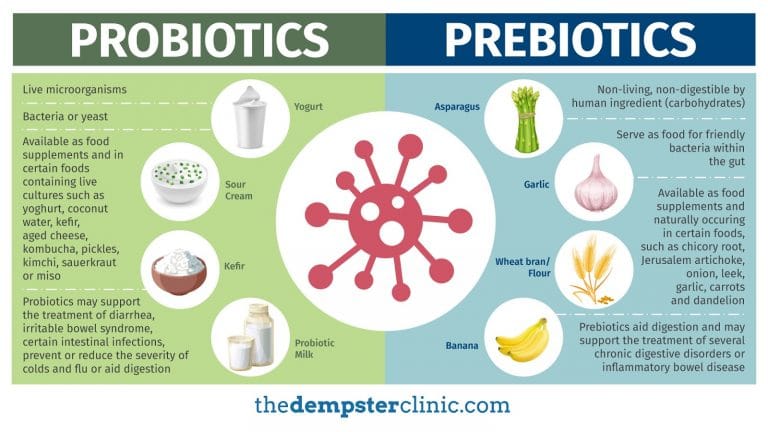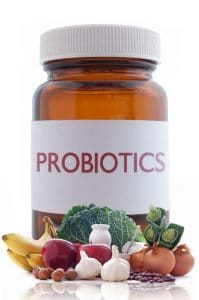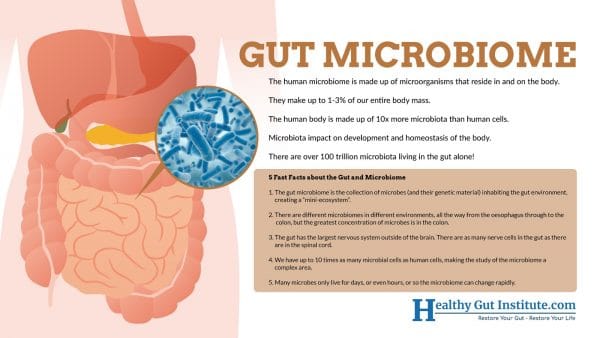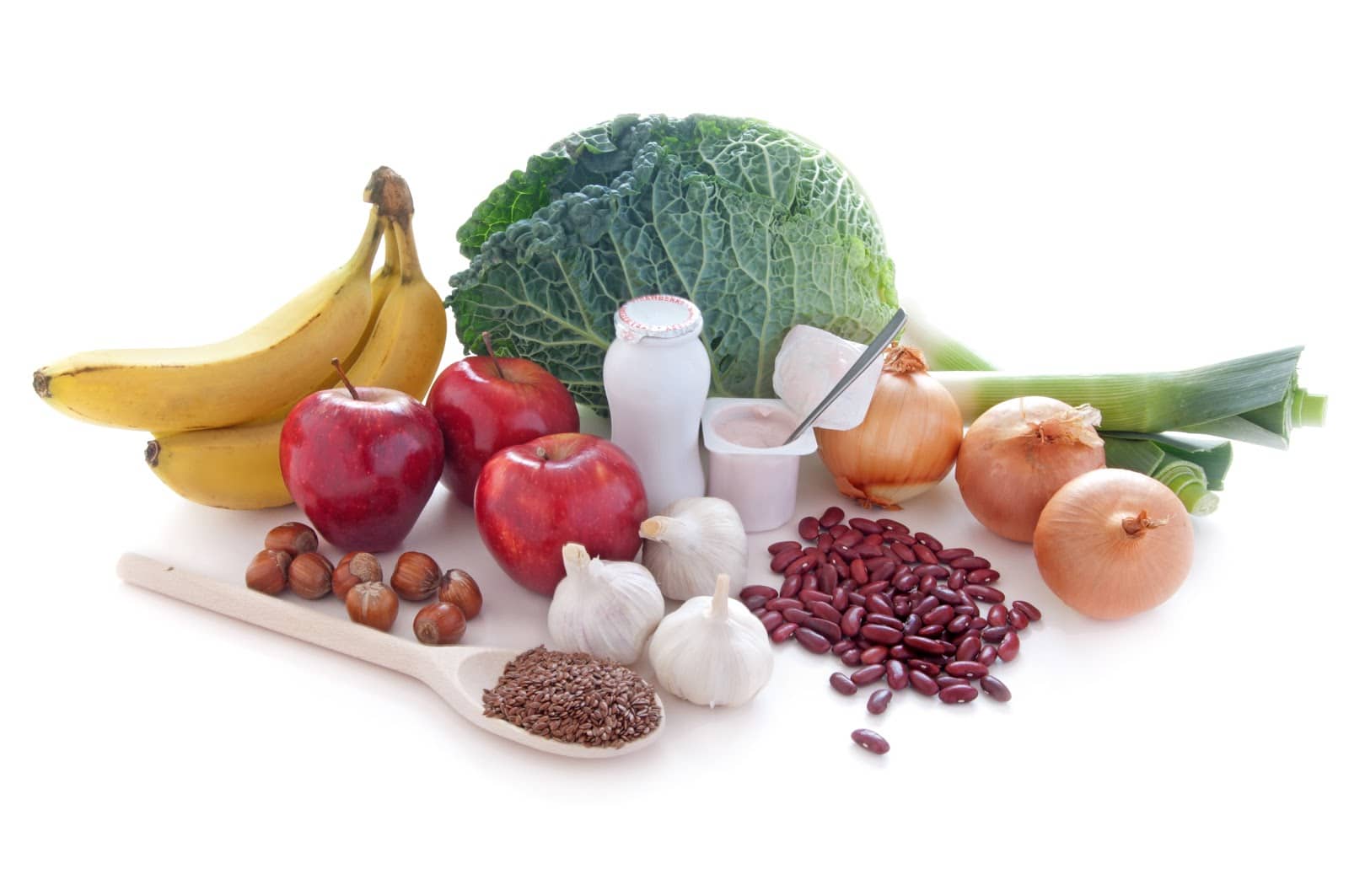Prebiotics and probiotics are both naturally-occurring substances that are vital for your health and wellness. However, while knowledge of probiotics has been increasing in public awareness, prebiotics aren’t quite as well known. Understandably, there’s quite a bit of confusion about prebiotics vs probiotics. Is one better than the other? And how are the two related?
In this article, I will define and explain prebiotics and probiotics. I will also help you understand how they work together to improve your health, why they matter, and in what food sources you can find them.
Prebiotics vs Probiotics: The Basics

Dietary prebiotics are a type of undigestible fiber called oligosaccharides. They act as “fertilizer” for the healthy bacteria within the gut. Since prebiotic fibers are undigestible, they easily move through the digestive system in order to serve as nourishment, or “food” for the various microbes and healthy bacteria in the large intestine, where they are fermented and absorbed. Prebiotics are present in foods like bananas, asparagus, oatmeal, soybeans, garlic, and apples.

In contrast, probiotics are foods or supplements with healthy, beneficial strains of live bacteria that are similar or identical to the good bacteria in your body. Their role is to help multiply this healthy bacteria that already exists in the gut. You can take probiotic supplements or ingest them through fermented foods, such as yogurt or kimchi. Other examples of foods rich in probiotics include sauerkraut, miso, buttermilk, tempeh, and kefir.
Health Benefits of Prebiotics
The benefits of consuming prebiotics are far-reaching, so they’re a wonderful addition to any holistic home health plan.
Notably, prebiotics are beneficial for mental wellness. In fact, one study demonstrated that they may help you resume a normal sleep pattern after a particularly stressful event. They also help with anxiety by lowering the stress hormone called cortisol.
Prebiotics are also valuable because they:
- Reduce the risk of colorectal carcinoma
- Cause better absorption of calcium
- Encourage healthy intestinal pH levels
- Ease symptoms of vaginal mycosis and peptic ulcers
- Fight Salmonella and E. Coli
Health Benefits of Probiotics
Like probiotics, prebiotics have their own unique set of advantages. For example, foods or supplements containing probiotics enable your body to better absorb nutrients from the food you eat, and they support a stronger immune system.

Additionally, probiotics:
- Help build up resistance against H. pylori infection
- Reduce inflammation
- Encourage healthy blood pressure
- Reduce the risk of developing eczema and other skin conditions
- Cut down on food sensitivities/allergies
Check out The 13 Amazing Benefits of Fermented Foods and the Power of Probiotics to learn more about the health benefits of probiotics.
The Combined Power of Prebiotics and Probiotics
As you can see, both prebiotics and probiotics have incredible health benefits, and their central mechanism of action is maintaining a balanced gut microbiome. This is important because gut health plays a huge role in how you feel; a healthy gut leads to less sickness and feeling more vibrant and energetic, both physically and mentally. When you ingest both, the prebiotics and probiotics work together to maximize these health benefits.

While prebiotics and probiotics are both beneficial on their own, when taken together, they complement each other and have a stronger effect. The synergy of adding healthy bacteria (probiotics) to the gut and “feeding” that healthy bacteria to make it multiply (prebiotics) is powerful!
Below are five noteworthy advantages of using both prebiotics and probiotics in your approach to wellness.
1. Improve Digestion
By incorporating prebiotics and probiotics into your diet, you can ease or even eradicate the symptoms of diarrhea, constipation, Irritable Bowel Syndrome (IBS), and Leaky Gut Syndrome. As you can see in the image below, problems in the gut are some of the main predisposing factors of IBS.

2. Treat Obesity
There is a direct link between an imbalanced gut microbiome and obesity. However, using prebiotics and probiotics as therapy is a safe and effective way to lower body mass index and fat mass in patients with obesity.
3. Heal Ulcerative Colitis
Ulcerative colitis is an acute, chronic bowel disease that can cause painful ulcers. One proven way to combat this is to consume prebiotics and probiotics, as they have been shown to stimulate healing of inflammation in patients with ulcerative colitis.
4. Promote Healthy Cholesterol Levels
High cholesterol levels are dangerous since they can lead to stroke and heart disease. Although high cholesterol is often treated with medication, prebiotics and probiotics are a natural and safe way to lower your cholesterol.
5. Strengthen the Immune System
Did you know that up to 90% of all diseases can be traced back to the gut and health of the microbiome within? When consumed individually, prebiotics and probiotics both help strengthen your immune system by increasing the number of healthy bacteria in your gut. But using both really bolsters this immune-boosting effect!
Prebiotics and probiotics change the expression of cytokines, which are messenger molecules within the body that help cells communicate and take action in immune responses such as infection or inflammation.
Synbiotic Foods
A food containing both prebiotics and probiotics is referred to as synbiotic. You can also create synbiotic pairings in which you consume a food item with probiotics and a food item with prebiotics at the same time. Remember, doing so maximizes the benefits of each.
To get you started, I have compiled a list of some easy synbiotic food combinations.
1. Unsweetened Yogurt + A Variety of Prebiotic Toppings
To ensure that it has probiotics, make sure to find “live and active cultures” labeled on the containers of the yogurt you buy. In addition to being a good source of probiotics, yogurt is rich in other important nutrients, like calcium and protein.
Stir in a prebiotic-rich topping, such as:
- Bananas
- Mango
- Chia seeds
- Flax seeds
These toppings are a great way to naturally sweeten yogurt and create a synbiotic food!

2. Kombucha with Chia Seeds
Kombucha is a fermented tea drink that you can find in most health food stores, and it is full of the probiotics your body needs. Since chia seeds are excellent sources of prebiotics, opt for kombucha with chia seeds mixed in. They add great texture and will enhance the benefits of the probiotics within the fermented drink.
This is a great fast and easy, on-the-go option!
3. Miso Soup with Prebiotic-Rich Veggies

Miso soup is a popular fermented food because it’s packed with millions of microorganisms just like the healthy ones living in your large intestine. To make this a synbiotic food, make sure your miso soup has plenty of veggies that contain prebiotics, like onions, artichokes, leeks, and asparagus.
4. Oatmeal + Probiotic-Rich Topping
Oatmeal is a heart-healthy dish that naturally contains prebiotics. Liven up your oatmeal with a topping that contains probiotics, such as soy milk or whole milk. A great way to add even more prebiotics is to stir in some fresh fruit or flax seeds.
The Pros and Cons of Supplements
Supplements are excellent because they are an easy way to make sure you’re getting your daily dose of prebiotics and probiotics. However, it is important to pay attention to the foods you eat and make sure they are nutritious, even when you are taking supplements.

The two most common types of bacteria in probiotic supplements are Lactobacillus and Bifidobacterium, although there are many different strains. Since probiotic supplements contain live bacteria, they must be kept refrigerated to keep the bacteria alive. The downside to probiotic supplements is that they can die due to heat exposure, or even just the passing of time.
Prebiotics require less maintenance, so they don’t require quite as much care as probiotic supplements.
Create the Best Wellness Plan at The Dempster Clinic-Center for Functional Medicine
Determining the best ways to incorporate prebiotics and probiotics into your diet is complex, and the “right” foods and types of supplements are different for everyone. At The Dempster Clinic- Center for Functional Medicine, I can work with you to develop a custom health plan to help you use prebiotics and probiotics to your advantage.
I am happy to offer a Complimentary 15-minute Discovery Session for all prospective patients. This session can take place over the phone or at the clinic in person. It provides an opportunity for you to learn more about the services I offer and how they can be of benefit to you.
Please schedule an appointment today! Your best health awaits.
Dr. John Dempster, ND
The Dempster Clinic- Center for Functional Medicine


